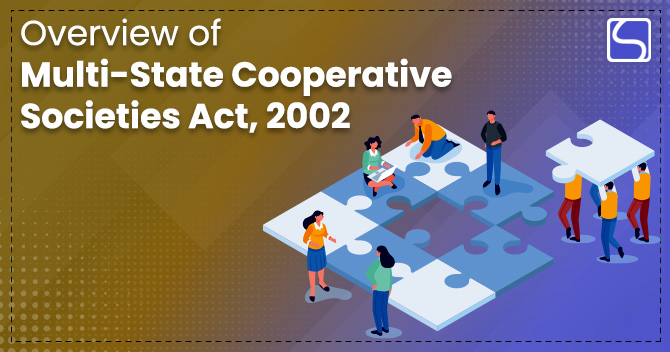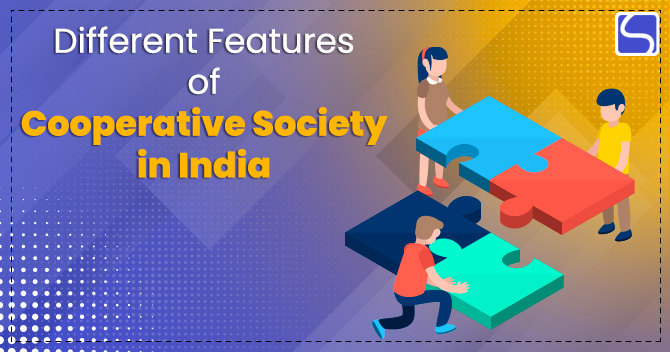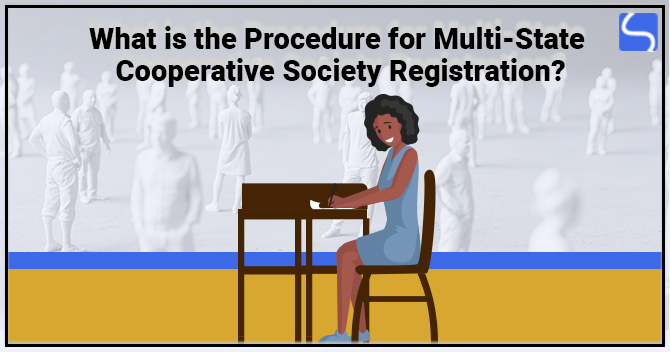Overview of Multi-State Cooperative Societies Act, 2002

Ganesh Nair | Updated: Aug 16, 2022 | Category: Cooperative Society Registration
Multi-state Cooperative Societies Act, 2002 was enacted by the legislature to lay down the laws for Cooperative societies that want to serve the interest of the members in more than one state. Cooperative societies registered under this Act shall be considered a corporate body with limited liability.
Table of Contents
Registration under Multi-State Cooperative Societies Act, 2002.
Application: A society to get registered under the Multi-State Cooperative Societies Act must make an application to the Central Registrar and comply with the following:
- In the case of Individual members: Signatures of at least 50 members from each state the cooperative plans to function is necessary.
- In case of members are cooperative societies of different states: In such cases, the cooperative members must send authorised representatives to sign on behalf of at least five such societies.
- If the members are Multi-state Cooperative societies, authorised representatives must be asked to sign on their behalf.
- The application must have four copies of the bye-laws of the cooperative society attached along with it as required by the Central Registrar.
Registration and Refusal
- The application must comply with all the provisions of the Multi-State Cooperative Societies Act, 2002.
- A cooperative society must state that its objective is to serve the interest of its members in multiple states.
- The bye-laws should clearly emanate the idea of the economic wellbeing of members via mutual aid and self-help in the spirit of cooperative principles.
- The bye-laws stated in the application should not go against the provisions of the Act.
- The Registrar has to dispose of the application in a span of four months from the date of its receipt.
- If the Registrar rejects the application, it should be communicated to the applicant within four months, along with the reasons for such rejection.
- If all the regulations are complied with, and there has been np lapse in the application then the Registrar shall issue the Certificate of Registration to the applicant.
Membership Rules
Chapter four of the Multi-State Cooperative Societies Act lays down membership rules.
Eligibility: Section 25 Multi-State Cooperative Societies Act states who can become a member of cooperative Societies:
- Any individual who is competent to contract as per section 11 of the Indian Contract Act 1872[1].
- Multi-state Cooperative Society, Cooperative Society, Central Government or State Government or any corporation/company controlled or owned by the government of India-[subsection (1) of section 25]
- Classes of persons as permitted by the Central Registrar.
- Section 26 enables the Multi-state Cooperative society to add a Nominal or associate member if a provision in the bye-laws specifies that.
Disqualification: Section 29 of the Multi-State Cooperative Societies Act states that a member shall be disqualified on the following grounds:
- If the member’s business is in direct competition or in conflict with the primary objective of the multi-State cooperative society.
- If the member under-utilises the services consecutively for a period of two years.
- If he failed to attend three consecutive general meetings and other members do not condone such absence.
- If the member has defaulted in the payment to the multi-state cooperative society as per the bye-laws.
Expulsion: A member shall be disqualified under the following rules mentioned in Section 30 of the Multi-State Cooperative Societies Act:
- Through a resolution passed with a two-thirds majority in a general meeting where the Act of a particular member has been found to be detrimental to the working of the Multi-state cooperative society. However, the member in question shall be given an opportunity to make a representation in the matter.
- Member who has been expelled under the provision as stated above as per section 30 subsection (1) shall not be able to rejoin the Multi-state cooperative before the completion of 1year from the date of expulsion.
Voting Rights:
- Each member and employee shall have ‘one’ vote in the affairs of the cooperative society.
- An employee is prohibited from voting during the i) election of a member of the board, ii) any general meeting to the frame or amend the bye-laws
- The chairman shall have the casting vote in stalemate situations.
- With reference to [(1) of section 25], each of the authorities shall have ‘one’ vote that the authorised representatives shall cast.
- Every member has to cast a vote in person, and Proxy voting shall not be allowed apart from the cases where representation is specified in the Act.
Shares and Shareholding
- No members, as mentioned in (1) of section 25 of the Act shall hold more shares than the limit prescribed in the bye-laws of the cooperative society, and in no case, it shall exceed one-fifth of the total prescribed shares.
- The transfer of the shares shall be restricted to a maximum amount as specified in the point mentioned above.
- The redemption of the shares shall be according to the rules mentioned in the bye-laws, and this redemption shall be on its face value of it.
- A multi-state cooperative society shall transfer the shares of the deceased members to their nominees. If a nominee is not specified, then it shall be transferred to his legal heir.
Management of Multi-State Cooperative Societies
- The General Body of a Multi-State Cooperative consists of all the cooperative members unless the bye-laws have expressly stated that a smaller body is to be created. In such case, the members of the MSCS shall have the power to contest an election, and members shall be given voting rights.
- General body meeting:
- An annual general meeting of the board should be held within six months after the end of the corresponding year. The purpose of the meeting can be for anything listed under S.39 (1) of the Multi-State Cooperative Societies Act.
- In case the general body meeting is not conducted within the specified time period. The Registrar General has the power to convene such a meeting 90 days after the expiration of the period mentioned above.
- Special meeting of General Body:
- Based on the board’s directions, the chief executive has the power to call a special meeting. This meeting can be called within a month of the date of receipt of such request from central Registrar or members.
- Board of Directors:
- Every MSCS must have a board of directors. The board of directors shall be elected through an election held in the general meeting.
- The board members shall be equal to the number mentioned in the bye-laws. However, this number should not exceed a maximum number of 21.
- The board can opt for two directors in addition to the 21 members.
- Election of board members:
- Election shall be held through a secret ballot.
- Election shall be conducted in the general meeting.
- Elected members shall be re-elected only if the bye-laws permit.
- The term of the elected members shall not exceed 5 years.
- Only a member of the general body of the society can contest elections for board members.
- Disqualification of board members:
- The following persons cannot be part of board members:
- A person who is insolvent or is of unsound mind.
- Is indulged in any profits of contract with the society.
- Has been convicted
- Holds any office or place of profit under society.
- Has been a member of the society for less than 12 months before the date of the election.
- Has an interest in any business similar to the one being carried out by the society
- Has borrowed a loan or goods from society on credit.
- Any person against whom a case is pending under this Act.
- Is employed/retained as a legal practitioner for or against the Multi-state cooperative society
- If a person is convicted under this Act.
- Is disqualified under Section 29 or is expelled under Section 30.
- Is absent for three consecutive board meetings/ general body meetings, and the members do not condone such act.
Privileges
- The Shares/ contribution or interest of an existing or deceased member in the capital of MSCS won’t be attached or sold under any decree or order of the court to clear the member’s debt or liability.
- Similarly, the reserve fund, bad debts reserve, or provident funds of MSCS shall not be attached under any decree or order for any liability incurred by the state.
- A Register of members shall be maintained, giving insights on members’ entry and cessation. This register book is an admissible copy of evidence for any legal proceedings.
- A member of a multi-state cooperative may, through an agreement with his employer, have deductions made in his salary, a part of which would be payable directly to the society.
- The MSCS may receive various aids from the government, such as :
- Subscribe to the share capital of MSCS
- Provide loans to the cooperative
- Guarantee the repayment of i) repayment of share capital, ii) loans and advances. iii) repayment of principal and payment of interest of debentures
Management of Funds & Properties
- Funds shall not be divided as profits amongst its members. However, the net profits of the cooperative to distribute as dividends or bonuses amongst the members
- Process of disposal of net profits:
- Cooperative shall not transfer an amount less than 25% of the reserve fund
- One per cent of the net profit must be given to the cooperative education fund maintained by the National Cooperative Union of India Limited, New Delhi.
- 10% of the reserve fund must be kept aside for dealing with unforeseen losses.
- Investment of funds: an MSCS can invest or submit it funds:
- In a cooperative bank
- In securities, as per section 20 of the Indian Trust Act
- Buy shares of other multi-state cooperative society or any cooperative society.
- With any bank
- Or any other manner as mentioned in the bye-laws.
- Restrictions:
- Restriction on contribution: no contribution shall be made by any multi-state cooperative society to further the interest of a political party.
- Restriction on borrowing: The total amount of borrowing should not exceed ten times the sum of subscribed share capital.
- Restriction on the transaction with non-members: transaction of the cooperative with non-members shall be governed by the rules specified in the bye-laws.
Conclusion:
The government devised the Multi-State Cooperative Societies Act in 2002 to allow the registration of cooperative societies that want new members and would like to operate in multiple states. It is a well-rounded act covering all aspects of the functioning of a Multi-state cooperative society.
Read our Article:Different Features of Cooperative Society in India













